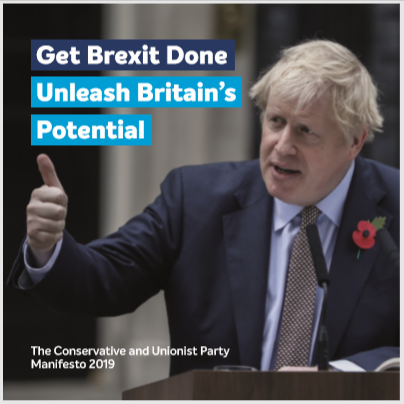
Given the relative lack of international development in any election, never mind one which revolves principally around the issue of Brexit and the reaction to the two personalities most likely to be entering Downing Street on the 13th December, the framing of international development is important. And whilst Labour frame their international development commitments under a ‘new internationalism’ global solidarity, the Conservative Manifesto is all about strengthening Britain in the World. Leaving aside the obvious counter that a good start to this might be to cancel Brexit, the Conservatives seem equally as convinced as Labour that Britain remains a global power, capable of shaping the world around its vision. But in terms of the appearance of international development and humanitarian action in the manifesto, the things this influence will be put towards doing, well, there really isn’t much there at all. Like Labour, the climate emergency will be at the heart of its efforts, which is important and good. It emphasises its role in promoting and protecting human rights for women and girls, for LGBT communities, and for faith minorities. And it promises to promote improved and decent animal welfare standards overseas. In terms of specific commitments, we have the 0.7 commitment; a pledge to “do more to help countries receiving aid become self-sufficient”; end preventable deaths of mothers and infants; and “lead the way in eradicating Ebola and malaria.” And that’s it.
Moreover, these aren’t real policy commitments, but aspirational statements taken straight from The Little Book of Development. Who isn’t trying to use aid to encourage countries to become self-sufficient? Would DFID under a different government not seek to end preventable deaths of women and children? Labour and the Liberal Democrats do attempt to put forward some understanding of the problems faced in achieving these obvious (and universally agreed) objectives. But the Conservative view required almost no thought in putting together. Probably because the person in charge was busy trying to find a nice picture of a dog to illustrate the commitment to animal welfare (which gets a whole page, compared to the 2 bullet points on international development related thinking). There is no mention of DFID in the document at all. Aid gets just the one. At least climate policy is given more space, though notably much of the policy is UK-focused.
If the Labour Party manifesto lacks a bit of ambition (in comparison to its domestic vision at least), it still reads as War and Peace compared to this one. And it’s not as if the Conservative party doesn’t have at least some story it can tell about its commitment to development over the past nine years. So why the absence? Partly, I guess, because this election really is all about Brexit (61 mentions in the 64 page document) for the Conservatives; partly because I’m not sure this is something on Boris or his advisors’ radars; and presumably also because the 0.7 commitment remains controversial amongst some of the party (perhaps fewer than often seems to be the case, but a vocal minority that have strong support from the likes of the Daily Mail).
In summary, disappointing doesn’t really cover it. It is the equivalent of the exam paper of a student who had a melt down half way through, and just scrawls ‘Get Brexit Done, and do some other stuff’ across the exam sheet. But given the Conservatives have been in power since 2010, and had effective control over DFID during the coalition period, there is a track record to give some clues. Since its creation in 1997, DFID has become a powerhouse of a government department, better funded and resourced than the Foreign Office, and often better housed than the official embassy or high commission in countries where both co-exist. David Cameron oversaw the increase of its funding to the 0.7% GNI, defended it against internal and media critics, and generally gave a relatively high priority to international development. It may not have been as high up Theresa May’s priorities, but neither was it a target for downsizing. On the other hand, international aid also became increasingly politicised, especially when presented under Priti Patel’s stewardship as a tool to support post-Brexit trade strategy; and the increased focus on the private sector.
Boris gives few indications that he has any substantial interest in this area, so perhaps the absence of international development and DFID’s future direction from the politicking of the Conservative campaign is a good thing, allowing DFID to effectively carry on as usual. But carrying on as usual, in the context of the climate emergency, is probably not what is needed. And here Labour, Lib Dem and Green proposals to make climate action much more central to DFID objectives is an important signal. There are still too many in DFID, as well as other development actors, analysts and academics, who posit a binary distinction between ‘development’ and ‘climate action’, arguing we need to sort out poverty before we can turn our attention to the latter. But given where we are, this distinction, if it ever held validity, surely can no longer be defended? And the opportunities that can come from a shift to low carbon economies and societies will, if embedded in development programming, also reduce poverty and the conditions that create and sustain poverty.
At least this time there is no indication that they are trying to redefine aid in what would have been deeply troubling ways. And the commitment to 0.7% is an indication DFID and UK aid will remain important areas for the government. But beyond that, there is little to draw on.
